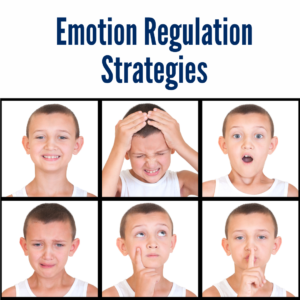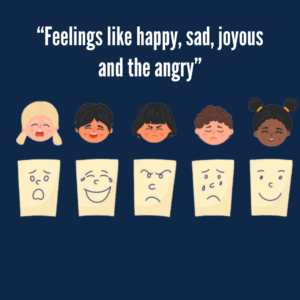“In The Tapestry of Childhood, the threads of EMOTIONAL INTELLIGENCE are woven with care and intentionality.”
“Emotional Intelligence,” coined by Peter Salovey and John D. Mayer in 1990, gained prominence through Daniel Goleman’s 1995 book.
It involves adeptly expressing and regulating emotions while respecting others’ feelings.
EI comprises two main facets:
- Intrapersonal (self-awareness and self-management)
- Interpersonal (recognizing and managing others’ emotions).
Commonly known as EQ, Emotional Intelligence often proves more influential than IQ in many scenarios.
According to the study of 40 Fortune 500 company–
Programmers having top 10 percentile of EQ produce software 3 times faster than programmers with low EQ, they have higher problem-solving skills and lower conflicts though they may have higher IQ.
Study says – Sales representatives having high EQ outperforms by 50% than the persons having low EQ.

Why to Raise Emotionally Intelligent Children?
1.The Imprint Period (How you were created and how you were programmed)-
80% of our personality is formed between 0 to 5 or 7 years. Most values and beliefs are programmed into us in this period. So, it’s easy if we teach Emotional Intelligence from schools than when they are adults.
Though anyone can develop higher EQ throughout life time.
“You are never too old to learn any skill.”
2.Emotional Literacy–
“When you were a 4-year-old kid – angry/sad/scared or didn’t understand what’s going on.”
How the adults responded- If you were lucky, they gave lots of space to express without trying to fix what was going on.
But many have opposite experience.
“We still value IQ more than EQ???”
We do not teach parents how to respond to children’s feelings and emotions with empathy and compassion.
We do not teach in KGs; we do not teach in Schools.
3.Repression–
We all are familiar to the words like- “Shut up”, “Stop crying”, “Stop it”, or familiar to a Frowning look – These all-feelings bubble up with age.
So, a child feels its not safe to express feelings openly.
4.Aggression–
Grown up in “Authoritarian Environment”?
You don’t have voice or can’t express what you feel. These feelings accumulate and may come out in the form of aggression, rage, loud words, and you will be labelled as “Naughty”, “Too much”, or “Troublesome”. When you are adult, these tendencies show up in – bullying behaviour, harsh critical thoughts, violence.
5.Expression–
Grow up with – “Feelings like happy, sad, joyous and the angry” everything are welcome?
Then when you grow as adult and things become hard: You reach for your journals, write down your thoughts or call a friend and say “can you listen to me?” or you might go for a run, do some yoga, speak to a therapist, find a way to handle the situations, finally let them go.
6.Ebrace Empathy–
“In a household of a caring mother and her two children, empathy reigns supreme.
When the youngest, in a fit of frustration, locks herself away, the mother, sensing her distress, sends the older sibling to help.
Confident in their bond, she cooks a comforting meal. Returning to find the once chaotic room now filled with shared concerns and laughter, the mother’s heart swells with pride.
Embracing both children, she sees the fruits of her teachings in their emotional connection and peaceful resolution.”
This tale underscores the importance of emotional intelligence in fostering resilient minds and fulfilling relationships.
8.Mental Health–
Children having higher EQ are less likely to experience depression and other mental illness.
A child if can calm self when angry is likely to do well in difficult times.

How to Raise Emotionally intelligent children?
- Labelling Emotions: Teach children to identify and label their emotions accurately, such as “happy,” “angry,” or “sad,” fostering self-awareness.
- Modelling Empathy: Parents and elders should demonstrate empathy, nurturing a culture of understanding and compassion that children absorb.
3.Expanding Emotional Vocabulary: Encourage children to develop a rich Emotional Vocabulary, which correlates with better emotional regulation and social skills.
4.Emotion Regulation Strategies:
Deep Breathing:
Teach techniques like the Square Breathing method to regulate emotions effectively.
Positive Self-Talk:
Guide children in using affirmations to bolster their emotional resilience and well-being.
By implementing these strategies, parents can empower children to navigate their emotions skilfully and cultivate strong interpersonal relationships.
Conclusion:
Sir Ken Robinson said “The aims of education are to understand the world around us and the world within us. But what if we prioritized the world within?”
It takes time and patience to grow emotional intelligence. Let’s validate and embrace our child’s emotional experience then the relationship will strengthen.
Strong relationships give life meaning and purpose and enable the creation of many unforgettable moments.
“When awareness is brought to an emotion, power is brought to your life.” – Tara Meyer Robson





Leave a Reply